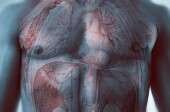(HealthDay) -- For patients with dilated cardiomyopathy, treatment with an autologous bone marrow-derived, expanded multi-cell product, ixmyelocel-T, is well tolerated and associated with improved symptoms at one year, according to a study presented at the Society for Cardiovascular Angiography and Interventions 2012 Scientific Sessions, held from May 9 to 12 in Las Vegas.
Timothy Henry, M.D., from the Minneapolis Heart Institute Foundation at Abbot Northwestern Hospital in Minnesota, and colleagues conducted a phase 2a trial to assess the safety and preliminary efficacy of intramyocardial delivery of ixmyelocel-T in 22 patients with ischemic and non-ischemic dilated cardiomyopathy. Participants with New York Heart Association (NYHA) Heart Failure Class III/IV, a left ventricular ejection fraction of 30 percent, and limited treatment options were randomly allocated in a 2:1 ratio to ixmyelocel-T or control. Bone marrow cells were cultured to expand the number of activated macrophages and mesenchymal cells and then injected into the heart muscle after cardiac mapping. Safety and efficacy were assessed at baseline and at three, six, and 12 months.
The researchers found that there were no procedural complications and no between-group differences in adverse events. Improved clinical outcomes were seen in patients with ischemic dilated cardiomyopathy, with a mean number of 0.22 major adverse cardiovascular events, versus 1.67 in control patients. Compared with controls or patients with non-ischemic dilated cardiomyopathy, more patients with ischemic dilated cardiomyopathy had improvements in NYHA Class, six-minute walk distance, and ejection fraction.
"Treatment with ixmyelocel-T was well tolerated and patients who received the cell therapy showed improved symptoms after one year," Henry said in a statement. "The results provide a strong basis for a larger clinical trial of this treatment in patients with dilated cardiomyopathy."
Several authors disclosed financial ties to biotechnology companies, including Aastrom Biosciences, which funded the study.
More information:
Press Release
More Information
Copyright © 2012 HealthDay. All rights reserved.


















